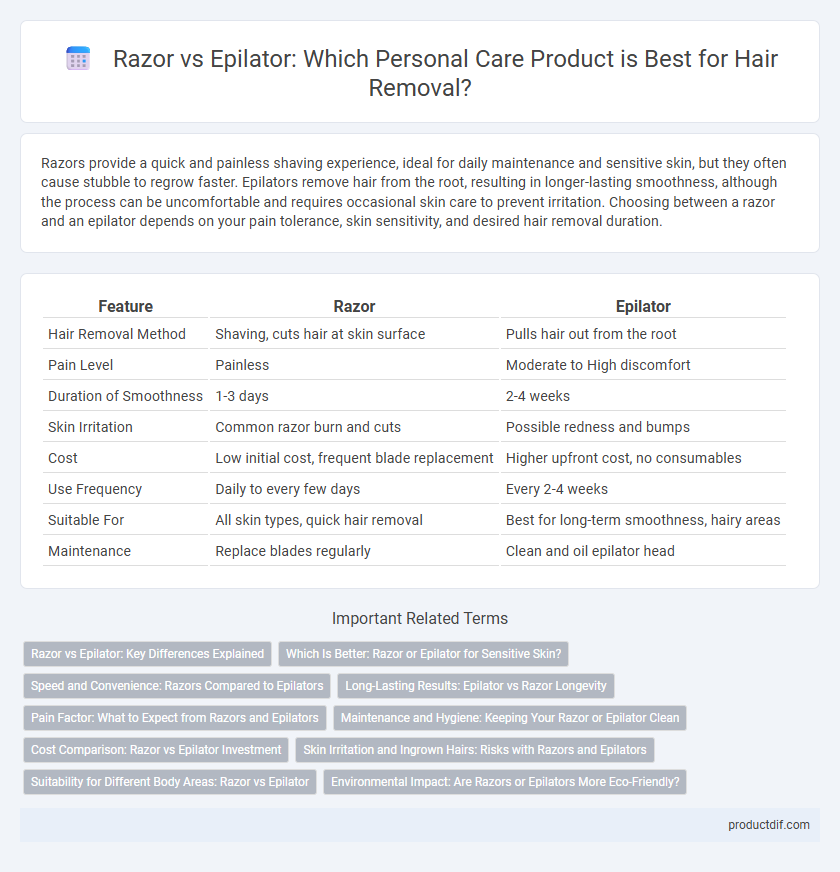Razors provide a quick and painless shaving experience, ideal for daily maintenance and sensitive skin, but they often cause stubble to regrow faster. Epilators remove hair from the root, resulting in longer-lasting smoothness, although the process can be uncomfortable and requires occasional skin care to prevent irritation. Choosing between a razor and an epilator depends on your pain tolerance, skin sensitivity, and desired hair removal duration.
Table of Comparison
| Feature | Razor | Epilator |
|---|---|---|
| Hair Removal Method | Shaving, cuts hair at skin surface | Pulls hair out from the root |
| Pain Level | Painless | Moderate to High discomfort |
| Duration of Smoothness | 1-3 days | 2-4 weeks |
| Skin Irritation | Common razor burn and cuts | Possible redness and bumps |
| Cost | Low initial cost, frequent blade replacement | Higher upfront cost, no consumables |
| Use Frequency | Daily to every few days | Every 2-4 weeks |
| Suitable For | All skin types, quick hair removal | Best for long-term smoothness, hairy areas |
| Maintenance | Replace blades regularly | Clean and oil epilator head |
Razor vs Epilator: Key Differences Explained
Razors remove hair by cutting it at the skin's surface, offering a quick and painless method ideal for daily or frequent use, but regrowth occurs within days. Epilators extract hair from the root, resulting in smoother skin lasting up to four weeks, though the process can cause temporary discomfort or irritation. Choosing between a razor and an epilator depends on pain tolerance, desired hair-free duration, and skin sensitivity.
Which Is Better: Razor or Epilator for Sensitive Skin?
Razors provide a quick, painless shave but may cause irritation, nicks, and razor burn on sensitive skin, while epilators remove hair from the root, offering longer-lasting smoothness with potential initial discomfort or redness. Sensitive skin benefits from using razors with moisturizing strips and hypoallergenic blades to minimize irritation, whereas epilators with adjustable speed settings and gentle epilation heads reduce pain and skin sensitivity. Choosing between a razor and an epilator depends on personal pain tolerance, skin reaction, and desired hair-free duration, with epilators favored for longer-lasting results and razors preferred for immediate, gentle care.
Speed and Convenience: Razors Compared to Epilators
Razors offer a quicker hair removal process, typically requiring only a few minutes for smooth skin, whereas epilators may take longer due to the need for slower, deliberate movements to pull hairs from the root. Razors provide immediate results and are ideal for last-minute grooming, while epilators demand an initial adjustment period and more careful handling to minimize discomfort. For everyday convenience and speed, razors are preferred, especially for users with tight schedules or sensitive skin.
Long-Lasting Results: Epilator vs Razor Longevity
Epilators provide long-lasting results by removing hair from the root, allowing regrowth to take up to four weeks, whereas razors only cut hair at the surface, leading to regrowth within a few days. The prolonged smoothness achieved with epilators reduces the frequency of hair removal sessions, enhancing convenience and cost-effectiveness over time. While epilators may require an initial adjustment period, their superior longevity makes them a preferred choice for durable hair removal.
Pain Factor: What to Expect from Razors and Epilators
Razors offer a quick and painless hair removal method by cutting hair at the skin's surface, making them ideal for sensitive skin and minimal discomfort. Epilators, however, remove hair from the root, which can cause moderate to intense pain, especially during the first few uses, but results last longer, typically up to four weeks. Pain tolerance varies individually, and some users find epilator discomfort decreases with regular use as hair grows finer over time.
Maintenance and Hygiene: Keeping Your Razor or Epilator Clean
Maintaining hygiene in personal care involves regular cleaning of razors or epilators to prevent bacteria buildup and skin irritation. Razors require rinsing after each use and periodic blade replacement for optimal performance, while epilators need thorough cleaning of the head and removal of hair debris to ensure effective operation. Proper maintenance extends the lifespan of both devices and promotes healthier, smoother skin.
Cost Comparison: Razor vs Epilator Investment
Razors typically require lower initial investment but incur ongoing costs due to frequent blade replacements and shaving gels, averaging $20 to $50 annually. Epilators involve higher upfront expenses, ranging from $50 to $200, yet offer long-term cost-effectiveness by eliminating recurrent consumable purchases. Over time, epilators provide a more economical solution for hair removal compared to razors, especially with consistent use.
Skin Irritation and Ingrown Hairs: Risks with Razors and Epilators
Razors often cause superficial cuts and micro-abrasions that increase the risk of skin irritation and ingrown hairs due to hair being cut unevenly at the skin's surface. Epilators remove hair from the root, which can reduce the incidence of ingrown hairs but may cause more intense initial skin irritation and follicular inflammation. Choosing the appropriate hair removal method depends on individual skin sensitivity and tolerance for temporary discomfort versus potential long-term skin issues.
Suitability for Different Body Areas: Razor vs Epilator
Razors are highly effective for quick shaving on larger body areas like legs and underarms, providing smooth skin with minimal irritation. Epilators excel in precision hair removal on smaller or more sensitive areas such as the bikini line and face, offering longer-lasting results by removing hair from the root. Choosing between a razor and an epilator depends on skin sensitivity, hair type, and the specific body area targeted for hair removal.
Environmental Impact: Are Razors or Epilators More Eco-Friendly?
Epilators offer a more eco-friendly option compared to razors, as they are reusable electric devices that significantly reduce plastic waste generated by disposable razor cartridges and blades. Razors contribute to environmental pollution due to their frequent replacement and non-recyclable components, while epilators have a longer lifespan and lower carbon footprint over time. Choosing an epilator helps minimize landfill waste and decreases the demand for single-use plastic products, supporting sustainable personal care routines.
razor vs epilator Infographic

 productdif.com
productdif.com